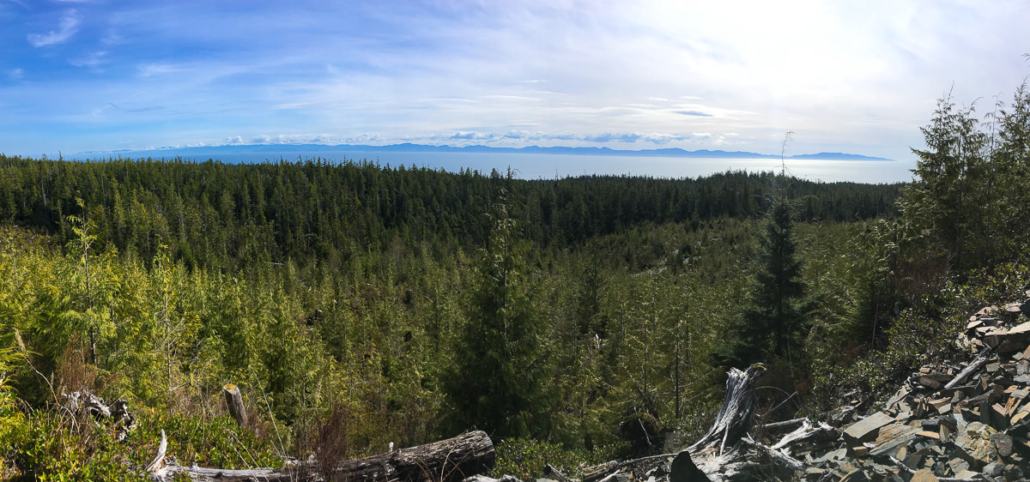 May 3 2019
May 3 2019B.C. delays timber auction near Juan de Fuca park
Times Colonist
May 3, 2019
New deadline is May 10 after environmental groups’ concerns prompt reassessment

View of the old-growth forest slated for logging by B.C. Timber Sales adjacent to a section of the Juan de Fuca Marine Trail. Photograph By TJ WATT
A backlash against plans to log old-growth forests near Port Renfrew has prompted the B.C. government to push back the timber sale by two weeks.
Forests Minister Doug Donaldson said the delay will allow the government to investigate concerns raised by environmental groups.
The groups reacted angrily after B.C. Timber Sales advertised plans to auction 109 hectares of old-growth forest in seven cutblocks — two of which come within 50 metres of Juan de Fuca Provincial Park.
The Ancient Forest Alliance says logging will damage forests that buffer the park and harm ecotourism in an area that has branded itself Canada’s Big Tree Capital.
The group adds that the proposed cutblocks contain large “legacy trees” that qualify for protection under provincial rules.
Donaldson said B.C. Timber Sales has extended the auction deadline to May 10 in response to the outcry.
“It gives us more time to investigate the information that’s been provided by environmental organizations about legacy trees being in some of the areas that [are] planned for logging,” he said, adding: “It’s part of best practices under B.C. Timber Sales to provide protection for those legacy trees.”
Donaldson said the government agency, which auctions off about 20 per cent of the provincial allowable cut each year, has already made adjustments for rare plant species in the area.
“They’re not aware of impacts directly for ecotourism operations within this licence area,” he said.
But environmentalists and local businesses say logging intact old-growth forests in the region will deal another blow to Port Renfrew’s economy, which is already reeling from new federal restrictions on chinook fishing.
“Today, the vast majority of business is related to tourism and leaving trees standing,” said TJ Watt, a campaigner with the Ancient Forest Alliance.
“They’re moving into a more modern and sustainable economy based on big-tree tourism, and the Juan de Fuca trail draws thousands of visitors in every year.”
He noted that one section of the trail is already closed for repairs. “If logging were to proceed, at the north end you could be hiking the trail and hear the sound of chainsaws and road-blasting all day long.”
Randal Pickelein, whose Mystic Beach Adventures company leads hikes on the Juan de Fuca Marine Trail, said logging near park boundaries detracts from the beauty that draws people to a region in the first place.
“I think it’s just an embarrassment,” he said. “[Logging] should be not be more important than all of the tourism industries that are employing more people. “And for future generations, it’s horrible what we’re leaving them.”
Environmental groups welcomed the government’s decision to extend the sale deadline, but they want the auction cancelled outright and the forests protected.
“They should be dropped indefinitely because of their very high ecological value,” said Jens Wieting, senior forest and climate campaigner with Sierra Club B.C.
“Overall, southern Vancouver Island has very little old growth left and we have to understand that climate change means even greater pressure on the unique plants and animals that depend on old growth.”
Donaldson said the government values the biodiversity provided by old-growth forests. “That’s why there’s 520,000 hectares of old growth already that won’t be logged on Vancouver Island.”
But he said the government also has to consider the impact on communities and forest workers of shifting away from old-growth logging.
“There has to be consideration of a fair transition for workers, as well,” he said.
To that end, Donaldson said the government is working on a “new old-growth strategy” for the province and expects to announce a public engagement process in the coming weeks.
Torrance Coste of the Wilderness Committee said conservationists recognize that it will take time to phase out old-growth logging.
“We realize that it’s not going to happen tomorrow,” he said. “But we argue that it needs to be phased out rapidly.”
And he said government could start by reining in its own agency.
“We’ve said that’s a place to start — start with B.C. Timber Sales,” he said. “And since this government’s been in, they’ve just ramped up, really, the amount of cutting that’s happening under BCTS. So that’s a huge concern.”
Coste said the government should put a halt to logging old-growth forests until it has a strategy in place.
“We need to see a proper plan from this government that lays out the adequate management and the survival of some of these ecosystems before we’re going to be OK with a government agency clear-cutting some of what we think is the last of it,” he said.





